#i am not a teacher for you
Explore tagged Tumblr posts
Note
Your reading compression skills are embarrassingly poor and several of your character analysis are subpar at best because it seems you take most things at face value and interpret the plot, details, and characters as black and white.
Literature is art and while art can be black and white, MXTX’s work is the type that is intentionally ambiguous and an array of blended colors. She does a great job of creating plots and characters with extensive levels of depth and complexity as well as humanity.
I hope one day someway somehow you develop better understanding of subtexts.
Oooh, over 24 hours this time? Thought you gave up.
#anyways hope you solve that weak morals problem#but unless you’re gonna start paying my salary#i am not a teacher for you#so I’m not gonna waste my time explaining how ‘nuancing’ crimes against humanity#because you empathize with the characters committing them#doesn’t make your ‘analysis’ mature or correct lmao#it just means you’re a terrible person#but we both already know that
27 notes
·
View notes
Text

pathologic 3 announcement made me return to the classic game and finally play it properly! i think my favorite part of the bachelor's route is when he talks to maria kaina (or whoever's in her body at the time) and they explain that their planned Utopia isn’t even supposed to be a 'perfect' place but instead 'the mystical manifestation of a world inscrutable and inaccessible to men' going back to the original meaning of the word irl and instead of despairing Daniil fervently agrees that this kind of unimaginable leap is worth it, no matter where it actually leads
#pathologic#the bachelor#daniil dankovsky#andrey stamatin#peter stamatin#maria kaina#nina kaina#recent interview with dybowski made me kind of apprehensive#because i love the idea of an emotional state as a fundamental game mechanic for the bachelor but#he was very focused on the idea of following the 'teacher' in Simon and in the process learning everything he was meant to learn#despite never really 'catching' the dead guy in his time loops#i feel that the head of the studio is just projecting again#and in a way that old version of the bachelor made back when he was a student in his twenties#could end up seeming more compelling in the end#but we'll SEE#i am still wildly hopeful and hype#my artwork#ALSO anybody who likes the bachelor and reads those rambling tags#you should totally check out blank monk by chekhov#its short
1K notes
·
View notes
Text
Quick note on Charles's speech for fic writers or anyone interested, really.
Charles uses tag questions, where he ends a sentence with a question, doesn't he? I see a lot of "innit" thrown at the end of sentences, which is right, sometimes.
There is unfortunately grammar. First off, if the main verb is negative, the tag will be positive, and vice versa.
When the main verbs in the sentence is a form of "be" or a modal verb (must, could, would, have, will, can, do etc), he's going to repeat that same form at the end of the sentence. An exception to this is a positive main verb of "I am" in which case the tag will be "aren't I?"
"[You're] Not going back to hell, are you?"
"I wouldn't wanna be dead with anyone else, would I?"
"No, we're not going anywhere, are we?"
"Well, I can't see where you're pointing to, can I?"
"We don't want a repeat of the infamous puppy debacle of '94, do we?"
He uses "innit" a lot less than people think, I think. It took me a while to find examples of him saying this, I ended up having to search a transcript. It follows the same rules as above, except the subject is always a thing, or the pronoun "it," and the main sentence is positive, so that the tag can be the negative "innit" (isn't it). *Edit* "innit" is not used as a question! It's mainly used to reinforce a talking point! (Thank you @elizabear). While the other tags are like rhetorical questions, this one is flat tonally and can end with a period, too.
"Boxing's a gentleman's sport, innit?"
"Magical void, innit?"
"That's the injustice we fight, innit?"
When the verb is not one of those above" he uses a form of "do."
"Well, that sounds a lot like you, doesn't it?"
"Wanna keep things professional, don't I?"
Charles also ends a lot of sentences with just the word "yeah."
"Psychic thing makes case work go a lot faster, yeah?"
I am usamerican, but I have a masters in Linguistics. People who actually use tag questions, though, please add on or correct me!
#dead boy detectives#dbda#charles rowland#sorry if this is obvious to people but I've seen “innit” thrown in at the end enough in fics that I just wanted to share#ignore if you want to! Charles and edwin's speech is part of my favorite things about this show though#dbda fic#sorry for forcing grammar on people#but also not really lol I am a teacher this is my job#I <3 grammar
2K notes
·
View notes
Text
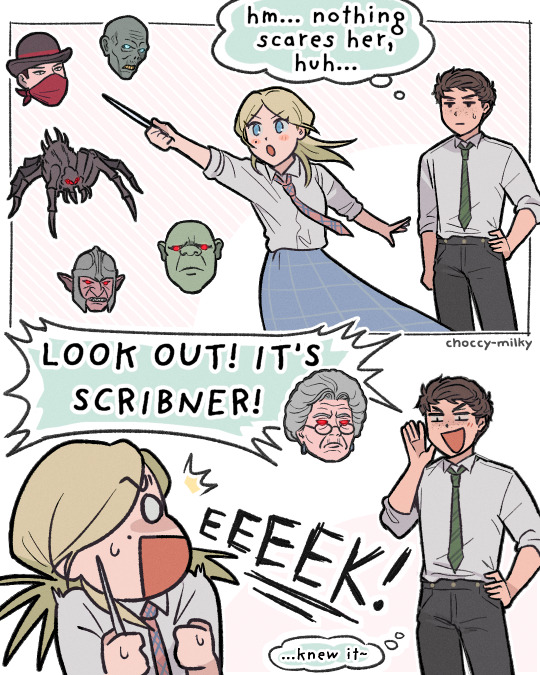
how to scare a goody two-shoes ravenclaw 👵🏻
#based on a scene from chap 4 of my fic ( lowkey its kinda giving “or worse... EXPELLED”)#inferi and spiders and dark wizards?? w.e.....SCARY LIBRARIAN THAT MIGHT GIVE YOU DETENTION?? now THATS spooky#someone commented on this chap recently and i always re-read/skim chaps that ppl comment on LOL#so when i read this again i had to draw it (even tho it doesnt actually happen and seb just THINKS about doing it) but this is how itd go😊#choccyart#hogwarts legacy#sebastian sallow#sebastian sallow x mc#sebastian sallow x oc#sebastian x mc#clora clemons#agnes scribner#one of the few things i have in common with clora is being a simp for authority...i loved being my teachers favourite LOL#even if i was a bad student i won them over by being the class clown LOOL#idc if my teachers think/knew i was stupid (i am) but they MUST think im funny and thats all that mattered🤡🤡🤡#for clora its the opposite tho ig LOOL she needs the teachers to know shes a good student BAHAH#being pegged as a delinquent is the worst thing that could ever happen to her😱😱😱😱 rip
814 notes
·
View notes
Text

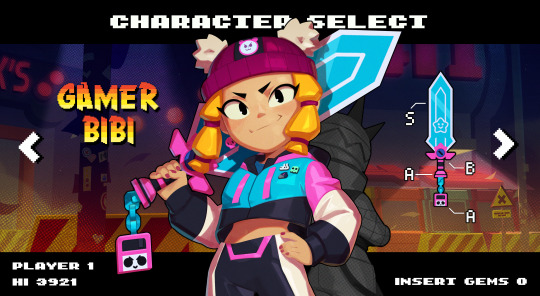


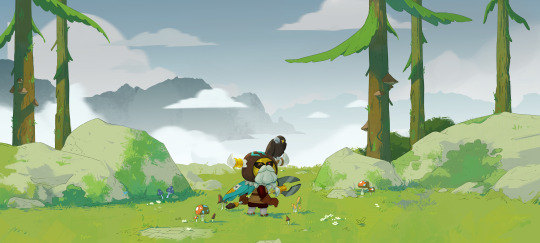
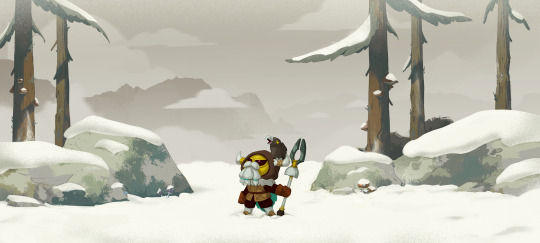

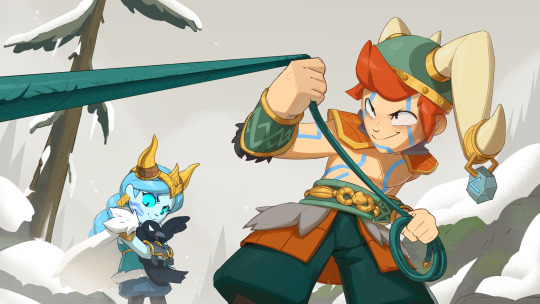
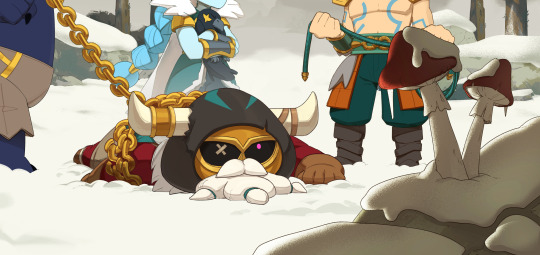


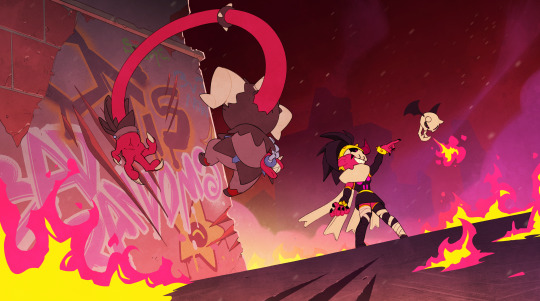





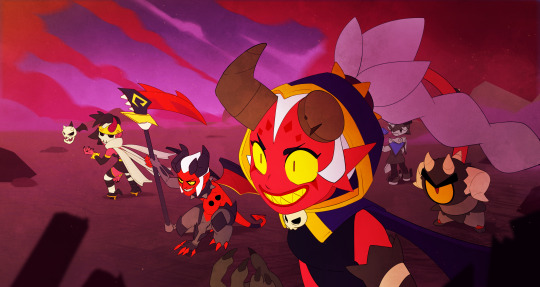

bro fuck it im workposting. i did illustrations, i storyboarded, i directed. I did many cool things in 2024 and millions of people all over the world saw em. that has to count for something
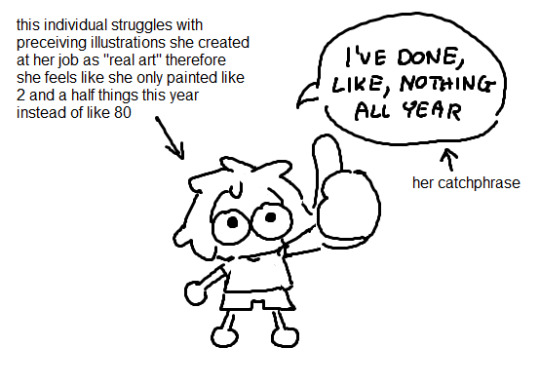
#brawl stars#marcia#i dont workpost because i am deeply aware nobody here is here for brawl stars but on god i#i work and i create and its real#and there is a part of me thats ashamed because i know that brawls is not. like its not league of legends you know?#league of legends is something you post about#about the skin you helped create or sculpted#or the splash art you painted#its has that... value that is obvious even in the eyes of a person who has never played league#its a very mature visual language that historically calls for respect#meanwhile presenting brawl stars art feels like showing my anime girl oc to an art teacher#even mentioning an illust i created for a skin announcement for brawl stars feels so#so dollar store#so laughable#like noone would take me seriously#it feels like when you say you're an artist and then a person asks to see your art#and you show them and they get that soft soft look in their eyes that informs you that they had an image of who an “artist” is in their hea#and that you did not live up to it but all they'll say is 'oh thats nice'#bro help me im doing art elitism to myself#how can i simultaneously believe that art can be anything and yet only neoclassical realism has real value#i want to be creatively free yet all i do is fear the unimpressed looks of strangers
551 notes
·
View notes
Text
have definitely harped on this before but it really does just drive me absoluely insane when you see a dog breeder talking the big talk of "well i dont breed my dogs FOR DOG SHOWS because i dont BELIEVE in showing, dog shows are just BEAUTY PAGEANTS and mean NOTHING, i breed my dogs for WHAT MATTERS which means HEALTH and TEMPERAMENT and GREAT FAMILY PETS!!" and then you go to look at their dog for more info and it's the most poorly-structured off-type albino lilac double merle dog you've ever seen with zero titles and a single Embark panel as proof of health testing.
#they are ALL LIKE THIS#its not even that i think confo is the end-all be-all of good ethics (it isnt)#but as soon as someone starts saying how they dont 'need' to show then you KNOW they've got an ugly unproven untested dog on their hands#girl put a fuckin CGC on that thang!! i've done it and i am TERRIBLE at training dogs whats your excuse!#'my dogs are great family pets' same energy as the parent telling their teacher their child is a genius while the kids eating glue#'DOG SHOWS ARE WORTHLESS BEAUTY PAGEANTS' mad bc ur dog is ugly arent u squidward
511 notes
·
View notes
Text

I started drawing this next day after I finished Act 6
13 or so days and it's finished!
Main things are traditional and Loop's body was edited digitally after
Unedited it looks like this

I've been torn on how to do Loop's body for the entirety of lining, also

A bit sad the main lines are visible only as a wip, most of this thing is literally just a ton of sharp lines
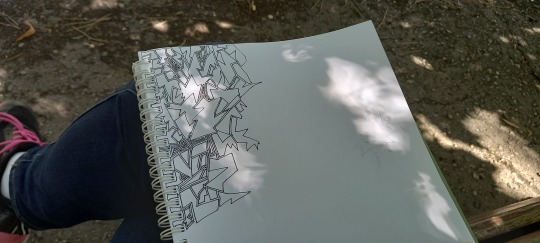
I think it's also my first day of drawing, Loop is just a sketch here (feat. my leg)

I even finished the beans before it so they were a moral support, because if you let me things like this take a year
#fanart#my art#isat#isat fanart#in stars and time#isat loop#loop#traditional art#artists on tumblr#Phew#So anyway this was my way of figuring out my thoughts after finishing the game#I didn't even actually finish it with credits playing at that moment#This type of art is my therapy#And in a way literally how my personality works from big figures to small details of thinking about anything#It's really calming!#I won't tag paper figures but they're here#Like special guests#In any case the funniest thing was showing this to my English teacher and she was like 'wow this looks stressed' or something#Like she immediately looked at the lines and after I showed her my old Flowey drawing like this she was like#'oh it makes sense! This one looks calm but this one is clearly you not feeling good'#Because I was kinda#Like sitting there in the semi-park and feeling sick since morning before I started drawing this and slowly I got better#I already talked about this on my first 'big' isat thing - I needed to think a bit#And not think at the same time just literally letting myself sort stuff out#Like. I fell asleep at 6 am that day and woke up at 10 4 hours of sleep after playing full Act 5 and two hats stuff IS STRESSFUL#SUPER STRESSFUL! Like I felt like I was playing for 4 hours while sleeping#Anyway by the time I finished it aka today I'm feeling way better and I'm literally talking a walk right now#Touching grass as we speak#Anyway phew!#Now to that animatic that's plaguing my mind to draw it nowww
893 notes
·
View notes
Text
Teachers don't want you to use wikipedia because they know you'll stop listening to them because wikipedia is so much sexier and smarter and cooler
#wikipedia#i am kissing wikipedia on the mouth rn#teachers are crying but i camt hear them over the sounds of wikipedia and i making out#we are making out sloppy style#[this is a joke most teachers are great and you should listen to them]#[ but its not a joke im kissing wikipedia]#aiden originals#am i queuing this right
8K notes
·
View notes
Text
Arthur: I'm tired
Merlin, who hasn't slept in 72 hours and has his fifteenth coffee intus: maybe you should go to bed
#bbc merlin#merlin#merthur#merlin bbc#arthur#concept#i'm actually tired#with a little headache#so this is all i can do for today#you know how my teachers all want us to calculate in 8 hours per week for one course?#I have 10 courses#and a job that's 17 hours per week because legally I'd loose my Student status if I worked more than 20 hours#when am i supposed to write fanfiction????
416 notes
·
View notes
Note
Hello. Sorry if this a stupid question u can ignore if u want.
How can someone get better at media analysis? Besides obviously reading a lot.
Im asking this bc im in a point where im aware of my own lack of tools to analyze stories, but i don't know where to get them or how to get better in general. How did you learn to analyze media? There's any specific book, essay, author, etc that you recommend? Somewhere to start?
I'm asking you because you are genuinely the person who has the best takes on this site. Thank you for you work!
it sounds like a cop-out answer but it's always felt like a skill I acquired mostly thru reading a ton, and by paying a lot of attention in high school literature classes. because of that I can't promise that I'm necessarily equipped to be a good teacher or that i know good resources. HOWEVER! let me run some potential advice to you based on the shit i get a lot of mileage out of
first off, a lot of literary analysis is about pattern recognition! not just pattern recognition in-text, but out-of-text as well. how does this work relate to its genre? real-world history? does it have parallels between real-life situations? that kind of thing.
which is a big concept to just describe off the bat, so let me break it down further!
in literature, there is the concept of something called literary devices - they are some of the basic building blocks in how a story is delivered mechanically and via subtext. have you ever heard of a motif? that is a literary device. it's a pattern established in the text in order to further the storytelling! and here is a list of a ton of common literary devices - I'd recommend reading the article. it breaks down a lot of commonly used ones in prose and poetry and explains their usage.
personally, I don't find all the literary devices I've learned about in school to be the most useful to my analytical hobbies online. motifs, themes, and metaphors are useful and dissecting them can bring a lot to the table, but a lot of other devices are mostly like fun bonus trivia for me to notice when reading. however, memorizing those terms and trying to notice them in the things you read does have a distinct benefit - it encourages you to start noticing patterns, and to start thinking of the mechanical way a story is built. sure, thinking about how the prose is constructed might not help you understand the story much more, but it does make you start thinking about how things like prose contribute to the greater feeling of a piece, or how the formatting of a piece contributes to its overall narrative. you'll start developing this habit of picking out little things about a text, which is useful.
other forms of in-text pattern recognition can be about things like characterization! how does a character react to a certain situation? is it consistent with how they usually behave? what might that tell you about how they think? do they have tells that show when they're not being trustworthy? does their viewpoint always match what is happening on screen? what ideas do they have about how the world works? how are they influenced by other people in their lives? by social contexts that might exist? by situations that have affected them? (on that note, how do situations affect other situations?)
another one is just straight-up noticing themes in a work. is there a certain idea that keeps getting brought up? what is the work trying to say about that idea? if it's being brought up often, it's probably worth paying attention to!
that goes for any pattern, actually. if you notice something, it's worth thinking about why it might be there. try considering things like potential subtext, or what a technique might be trying to convey to a reader. even if you can't explain why every element of a text is there, you'll often gain something by trying to think about why something exists in a story.
^ sometimes the answer to that question is not always "because it's intentional" or even "because it was a good choice for the storytelling." authors frequently make choices that suck shit (I am a known complainer about choices that suck shit.) that's also worth thinking about. english classes won't encourage this line of thinking, because they're trying to get you to approach texts with intentional thought instead of writing them off. I appreciate that goal, genuinely, but I do think it hampers people's enthusiasm for analysis if they're not also being encouraged to analyze why they think something doesn't work well in a story. sometimes something sucks and it makes new students mad if they're not allowed to talk about it sucking! I'll get into that later - knowing how and why something doesn't work is also a valuable skill. being an informed and analytical hater will get you far in life.
so that's in-work literary analysis. id also recommend annotating your pages/pdfs or keeping a notebook if you want to close-read a work. keeping track of your thoughts while reading even if they're not "clever" or whatever encourages you to pay attention to a text and to draw patterns. it's very useful!
now, for out-of-work literary analysis! it's worth synthesizing something within its context. what social settings did this work come from? was it commenting on something in real life? is it responding to some aspects of history or current events? how does it relate to its genre? does it deviate from genre trends, commentate on them, or overall conform to its genre? where did the literary techniques it's using come from - does it have any big stylistic influences? is it referencing any other texts?
and if you don't know the answer to a bunch of these questions and want to know, RESEARCH IS YOUR FRIEND! look up historical events and social movements if you're reading a work from a place or time you're not familiar with. if you don't know much about a genre, look into what are considered common genre elements! see if you can find anyone talking about artistic movements, or read the texts that a work might be referencing! all of these things will give you a far more holistic view of a work.
as for your own personal reaction to & understanding of a work... so I've given the advice before that it's good to think about your own personal reactions to a story, and what you enjoy or dislike about it. while this is true that a lot of this is a baseline jumping-off point on how I personally conduct analysis, it's incomplete advice. you should not just be thinking about what you enjoy or dislike - you should also be thinking about why it works or doesn't work for you. if you've gotten a better grasp on story mechanics by practicing the types of pattern recognition i recognized above, you can start digging into how those storytelling techniques have affected you. did you enjoy this part of a story? what made it work well? what techniques built tension, or delivered well on conflict? what about if you thought it sucked? what aspects of storytelling might have failed?
sometimes the answer to this is highly subjective and personal. I'm slightly romance-averse because I am aromantic, so a lot of romance plots will simply bore me or actively annoy me. I try not to let that personal taste factor too much into serious critiques, though of course I will talk about why I find something boring and lament it wasn't done better lol. we're only human. just be aware of those personal taste quirks and factor them into analysis because it will help you be a bit more objective lol
but if it's not fully influenced by personal taste, you should get in the habit of building little theses about why a story affected you in a certain way. for example, "I felt bored and tired at this point in a plot, which may be due to poor pacing & handling of conflict." or "I felt excited at this point in the plot, because established tensions continued to get more complex and captured my interest." or "I liked this plot point because it iterated on an established theme in a way that brought interesting angles to how the story handled the theme." again, it's just a good way to think about how and why storytelling functions.
uh let's see what else. analysis is a collaborative activity! you can learn a lot from seeing how other people analyze! if you enjoy something a lot, try looking into scholarly articles on it, or youtube videos, or essays online! develop opinions also about how THOSE articles and essays etc conduct analysis, and why you might think those analyses are correct or incorrect! sometimes analyses suck shit and developing a counterargument will help you think harder about the topic in question! think about audience reactions and how those are created by the text! talk to friends! send asks to meta blogs you really like maybe sometimes
find angles of analysis that interest and excite you! if you're interested in feminist lenses on a work, or racial lenses, or philosophical lenses, look into how people conduct those sort of analyses on other works. (eg. search feminist analysis of hamlet, or something similar so you can learn how that style of analysis generally functions) and then try applying those lenses to the story you're looking at. a lot of analysts have a toolkit of lenses they tend to cycle through when approaching a new text - it might not be a bad idea to acquire a few favored lenses of your own.
also, most of my advice is literary advice, since you can broadly apply many skills you learn in literary analysis to any other form of storytelling, but if you're looking at another medium, like a game or cartoon, maybe look up some stuff about things like ludonarrative storytelling or visual storytelling! familiarizing yourself with the specific techniques common to a certain medium will only help you get better at understanding what you're seeing.
above all else, approach everything with intellectual curiosity and sincerity. even if you're sincerely curious about why something sucks, letting yourself gain information and potentially learning something new or being humbled in the process will help you grow. it's okay to not have all the answers, or to just be flat-out wrong sometimes. continuing to practice is a valuable intellectual pursuit even if it can mean feeling a tad stupid sometimes. don't be scared to ask questions. get comfortable sometimes with the fact that the answer you'll arrive at after a lot of thought and effort will be "I don't fully know." sometimes you don't know and that can be valuable in its own right!
thank you for the ask, and I hope you find this helpful!
#narrates#thanks for the kind ask! i feel a little humbled by your faith in me aha#this may be a bit scattershot. its 2 am. might update later with more thoughts idk#nyway i feel like a lot of lit classes even in college don't tell you why they're teaching you things that might feel superfluous#hopefully this lays out why certain seemingly superfluous elements of literary education can be valuable#the thing esp about giving theses and having a supporting argument... its not just because teachers need to see an essay or whatever#the point is to make you think about a text and then follow thru by performing analysis#and supporting that analysis w/ evidence from the text#u don't have to write essays but developing that mindset IS helpful. support ur conclusions yknow?#anyway thanks again hope it's illuminating
209 notes
·
View notes
Text
one of the posts on this website that haunts me is the one that claims neurotypicals instinctively know to read faster by reading the first and last paragraphs of an article and then skimming it if confused. I can't even begin to understand how someone would form such a bizarre belief.
#to be clear y'all it was specifically presented as a study hack i believe#not for like. the news#my teacher told us it for academic artilces which have intros summaries and conclusions#My teacher in COLLEGE literally taught us this today. It's a learned skill. for everyone.#also sorry for being controversial i did not expect or intend for this post to get popular#i did change the wording btw to be more clear if u saw a reblog#I said this#tumblr#neurotypical#neurodiversity#can you guys stop reblogging this i have all asks off but i'm getting afriad i accidently stepped on a hornet's nest with them and am about#to get a bazillion reblogs debunking every word i said or somehting#how is this still getting notes
275 notes
·
View notes
Text
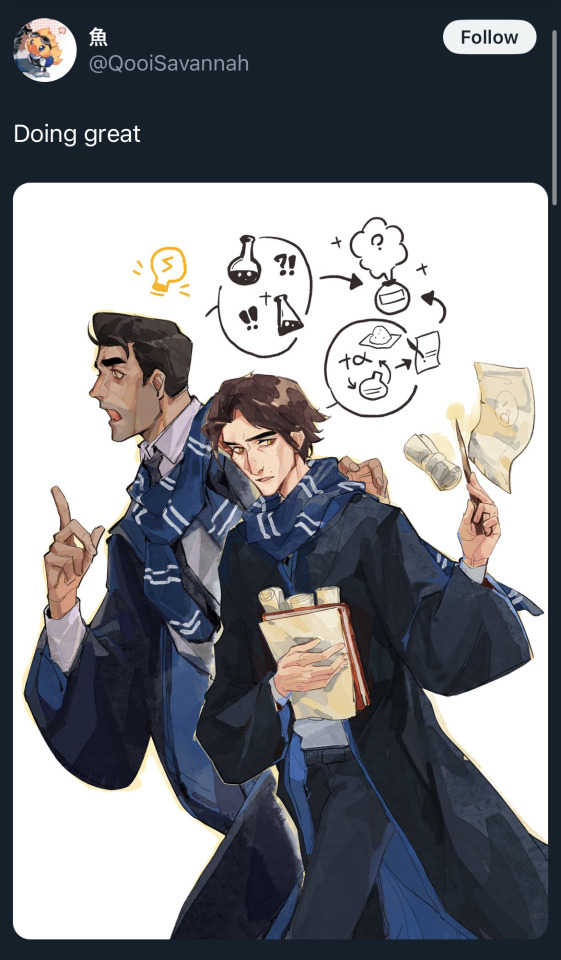
This artwork (link below) is giving me sooo many ideas for jayvik x hp crossovers, especially post s2 …. I used to be SUCH A FIEND for harry potter crossover fics (still a fiend for crossover fics in gen) and it would be so cool if like after jayvik get zapped away by the stone they come out the other side in the hp universe and then have to learn how to navigate this world where magic exists?? But in a different form from the arcane and its revered in a way?? and an entire secret society and school exists just to teach kids magic?? And in this school theres no tech, no engineering?? Plus not to mention all the political bs as well omg
And how would they get involved with the school in first place…maybe they pop right into the school? I wish i remembered more from the books bc i feel like theres totally an event i could use but I just can’t remember much outside from like the first two books 😭
If anyone wants to brainstorm with me feel free bc like i said i loooooveee crossovers and now that im finally on break (and i have adderall now) I think i might actually start some fics
Art is here btw
#aloonaram thots#jayvik#jayce talis#viktor arcane#arcane#jayce#arcane x hp#idk just so many loose thoughts#would love to see them as teachers but what would they teach?#i also personally am not a fan of the crossovers that ignore the plot of the original show if you get what i mean#i like crossovers where the characters by some form of magic or whatever pop into the other storylines universe so they retain all their#previous memories and context#mostly bc to me their og stories are what makes the character who they are#what makes them interesting#so in getting rid of that the characters feel less appealing#to me at least thats just my opinion#and obv theres been some fics that are still FIRE despite that that ive enjoyed so yk#just depends on how theyre written
219 notes
·
View notes
Text
One thing I wish I'd see more of among Ratio fans is some thought about how he views himself as a teacher.
Like yes, of course he refuses to compromise on the quality and rigor of the education he imparts, and he would find it unforgivably unethical to lower his standards in order to pass more students who had not genuinely learned the material. This is core to his character.
However, as someone who is a teacher IRL, I know the absolutely miserable feeling setting that kind of standard can cause. There's the obvious disheartening sense of disappointment ("Are students these days really not capable of doing the work correctly? Is our future in danger, if this is the highest level of understanding our current generation of students can achieve?"), but even worse than that is the self-doubt.
"Is this somehow my fault? Am I not teaching this material in the right ways for the students to learn? Is there something I could have done differently to get through to these students? Would a better teacher have a higher passing rate?"
We know that Ratio does (or at least did) struggle with feeling inferior to the Genius Society, so I think it is also likely, as much as he absolutely will not budge on his academic standards, that he has doubts about his teaching ability as well.
This is the man who wants to educate the entire world to cure the disease of ignorance, and yet only 3% of his actual students are able to get there. How can someone who gets so few of his direct students to a state of enlightenment hope to enlighten the whole universe? If so few students are successfully learning the material of a given class, doesn't that mean the teacher is doing something wrong?Would a better teacher--would a genius, maybe--not be able to impart their knowledge more efficiently and educate even the most challenging of students?
As someone constantly struggling with that balance between keeping academic standards high while also meeting the needs of today's students, I think the passing rates of his courses must affect Dr. Ratio much more deeply than I've seen fans discuss. I think he would question himself harshly over his class success rates, and I think he must be constantly trying to push himself to become the best teacher he possibly can be.
tl;dr: I hope one day the HSR fandom will stop sleeping on the fact that Ratio is an actual practicing professor who probably has astronomical levels of teacher angst. 😂
#honkai star rail#dr. ratio#not to be#ratiorine#in everything I post but#secretly this is just an excuse to imagine Aventurine throwing Ratio a sympathy party#a “Let's eat our feelings" party because the doctor just got his course evals back#and there are some insults on there that would make his ancestors cry#I can just imagine Aventurine reading out the really obnoxious Rate My Professor reviews#in whiny entitled voices#just to squeak a smile out of a gloomy Ratio#but I also really like the idea of Aventurine helping Ratio become a better teacher!!#because he's sharp and a fast learner#but he doesn't have a background in formal/public education#he's not set in the system's ways#he could suggest some really out-of-the-box ideas to help Ratio get through to more students#and be a great sounding board for Ratio's lesson material#brutally honest feedback lol#“Ratio I am in love with you but I still can't listen to you talk about gravitational time dilation for one minute more”#“You're going to HAVE to make this lecture less dry than my martini.”#look let me just enjoy this teacher fantasy for a sec#lol
402 notes
·
View notes
Text

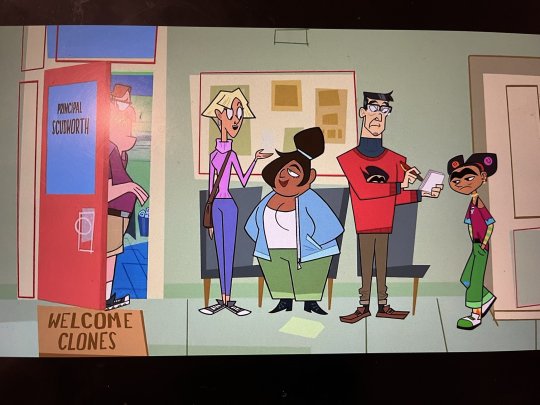
ah bless, my secret Pearlmethyst moms BG characters made it into the final Clone High Ep
#clone high#steven universe#pearlmethyst#look if you give me the opportunity to design parents for the parent teacher conference episode#I am going to make lesbian moms that vaguely resemble one of my favorite ships#but in the end it is just a fun silly harmless detail#enjoy!
704 notes
·
View notes
Text

Hey everyone! Sorry I was gone for so long, I was busy with a project in another fandom. But I want to come back to drawing a mix of my interests again! Here's a watercolor Monomon :)
#Bit of an update: I got into college! Not sure what that means for art in the future but we'll see#I'm going to be doing artfight again (posting later probably)#And am also setting up a Kofi with a new commission system coming soon!#Thank you all for the patience C:#hollow knight#hollow knight art#hk fanart#hollow knight fanart#monomon#monomon the teacher#watercolor#watercolour art
324 notes
·
View notes
Text
An Open Letter to Neil Gaiman in the wake of the Allegations
Mr. Gaiman,
There's a likely chance you will never see this, so this is as much for my fellow heartbroken fans and for myself as it is for you. Many of us feel the need to process this in the spaces we share--the spaces where we so often shared our love and admiration for your work: for the worlds you created that we have shared, enjoyed, and explored together. My name is Cassie. I'm a teacher. I too am a storyteller, a wordsmith, a lover of knowledge. I teach mythology, history, and ancient languages--subjects which I saw woven into your writings. It is my joy and privilege to share these subjects and my passion for them with young minds, just as it has been yours to share your love and passion through your mastery and craftsmanship with words and the research you wove into the words you built.
Why do I point out these similarities? Because while we are not the same, we share a great responsibility. I inspire young minds, and in turn, there are times when I see the admiration in my students' faces. Some of them look up to me. They see me as a source of knowledge, wisdom (though god knows I don't have much), and stability. They rely on me to create a space where their curiosity and enthusiasm can flourish. I see the way some of my students light up when they see me, how they love to share their discoveries with me, and sometimes they gift me with their precious trust.
It would be easy for me to lead those students where I wanted. The ones who look at me with trust and excitement in their eyes when I affirm them-- the ones who see me as someone to admire, someone whose praise they want to earn. Because they are young and impressionable--yes. But also, because I have been gifted this role in their lives. Some of them would be excited if I invited them to a personal dinner at my house. Some of them would see that as a reward to be desired, would be eager to go on a drive alone with me.
And yet, I suspect you know that it would be wrong for me to give my students special alone time or special gifts. That it would tarnish the safety of my relationship with that young person. That it would open them up to exploitation at my (or another teacher's) hands. Even if I mean well, it teaches that young mind that special alone time is okay, and that they can accept it safely. A young person who is taught that such attention is safe, who receives that attention--that one on one praise and affirmation--may cast aside their doubts or worries and chase after it, craving the promise of being unique, of being chosen by someone they trust and admire.
It is my job to teach them that safe adults--safe authorities--will never offer or ask for that, will never put them in a situation where they have no other safe adult or authority in their confidence regarding their relationship with you. That they must steer clear of the promise of "special" attention from an authority like that.
You, Mr. Gaiman, are the man against whom I warn my students.
You were given a precious gift. You were able to bless countless young minds with the experience of a fantasy world, of mesmerizing stories that inspired their imagination, made them laugh and cry and dream. Young people admired and idolized you, and when they came to you at fan events or crossed paths with you, they saw you-- just as my students see me--as someone whose praise and attention was to be desired.
You took that trust, and you used it to your advantage. You saw a young soul that looked at you with admiration of a student, of someone who wants to learn from you. You used that innocence, that ignorance, to take pleasure for yourself at their expense. There was a power dynamic between you and your fans: young women who wanted to be close to a person they admired--who believed you to be wiser, smarter, more gifted than themselves. You did not honor it. You did not treasure it. You used it. And you used it again and again and again.
Mr. Gaiman, I believe your victims. But please understand. Even had you not ignored their "no"-- even had you not gone to physical extremes that caused them harm and trauma, even had you only engaged in what were (according to the law) permissible sexual relationships -- in my eyes, you would still be reprehensible.
I am a teacher. It is my job to protect these young minds. If my students ever ask about or speak about you, in my classroom and in my school as far as I am concerned, you will be nothing more than a cautionary tale. You will be the example of a man (or woman) whom I must teach them to regard with suspicion. You committed an act which I consider most disturbing for a person of my profession. You used the precious, beautiful trust of a young mind to your own gain.
I hope that your public reputation is so damaged that no other young woman will venture into your snares again. But if someone does, please read my words.
When you see that starstruck look in a young person's eyes, see the joy and admiration, remember this: She sees you with the eyes of a child; the youthful excitement of meeting someone who is, in her mind, greater than her.
Nurture and protect that young mind. Model how a true leader responds to trust. Be the sort of man who deserves that admiration. Remember that the look in her eyes is its own reward. Be sure that she knows there are no secrets between you, that she is never alone with you, and remember-- when someone admires you that way, no matter whether she is of legal age, she will always be as a child before you.
As someone who fosters young minds, I am profoundly disappointed in you.
You do not deserve a second chance. But if you ever get one, do better.
Sincerely, A former childlike admirer of your works
#tw neil gaiman#good omens season 3#go3#good omens s3#go3 speculation#save good omens 3#save good omens#resume good omens 3#good omens#neil gaiman allegations#fuck neil gaiman#neil gaiman#the neil gaiman allegations#gaiman allegations#open letter to neil gaiman#teacher#school#good omens 3#good omens fandom#gaimangate#fuck you gaiman#I am heartbroken#ineffable husbands
130 notes
·
View notes